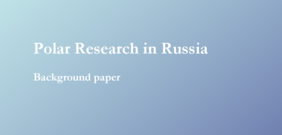Research development in the Arctic and Antarctic play an important role in Russian policymaking. Although, due to its size and bureaucratic complexity, there are unique challenges in regulating and funding polar research in Russia, with its scientific networks and facilities widely covering various domains related to the Arctic and Antarctic. Remoteness of the polar regions, necessity for continuous improvement of the polar research stations and other research facilities, as well as climate change and other challenges trigger the interest in a greater scientific cooperation both within Russia and internationally.
This document was prepared for the European Polar Board’s Action Group on International Cooperation as a background paper with the aim to map Russian polar research actors and infrastructure and to help EPB and its Members, as well as general public, navigate the country’s Arctic and Antarctic scientific landscape. It provides an overview of Russian policies and legal framework in the area of the Arctic and Antarctic research, its stakeholders and infrastructure, international cooperation in the polar regions, as well as funding.
The important part of this background report is its glossary. It is dedicated to recording major actors in Russian policymaking in the polar regions, academic institutions, and their fleet. The glossary is not exhaustive, but it provides a good outline of the actors involved and may be consulted separately from the main document. Notably, it includes the links and basic information on all the mentioned actors.
All the information used in this paper was found in the publicly available sources. Some chapters include information on representatives of governmental bodies or research institutions. This information reflects the situation as of October 2021 and requires regular updates.
To view the report, click here. The report was prepared by Nina Lavrenteva, University of Liège, for the EPB Action Group on International Cooperation.

